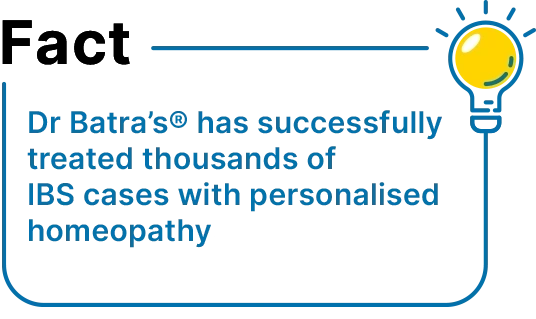IBS Treatment in Homeopathy
Personalised care to soothe your gut and restore comfort, the gentle way
Book your Appointment
Irritable Bowel Syndrome (IBS) is a functional digestive disorder that affects the large intestine. It often causes abdominal pain, bloating, constipation, or diarrhea. These symptoms affect digestion and disrupt daily life, emotional well-being, and confidence
At Dr Batra’s®, we use a root-cause-based homeopathic approach that manages IBS symptoms and supports emotional wellness, offering long-term relief, safely and naturally
With over 40 years of experience, we have helped countless individuals regain digestive comfort and control
Individualised remedy selection for IBS
Combines gut healing with stress management
No harsh chemicals or side effects
Online & in-clinic support for continuity of care
200+ clinics & 350+ homeopathic doctors worldwide

Remedies are selected after understanding your medical history, emotional state, and symptom pattern
A case from Dr Batra’s® Cured Cases – Coffee Table Book (Vol. 1) featured a patient with IBS triggered by spicy, oily food, causing acidity, burning, and loose motions. With Dr Batra’s® personalised homeopathic treatment, the patient experienced lasting relief and improved gut comfort
Homeopathic immunity remedies are uniquely suited to:
Step 1
Detailed gut health and lifestyle assessment
Step 2
Symptom-specific medicine plan with emotional mapping
Step 3
Month-wise symptom tracking & diet support
Step 4
Stress-management guidance and follow-ups
Step 5
Improved digestion, mood, and symptom-free living
Works on gut and mind simultaneously
No drug dependency or harsh side effects
Improves bowel regularity and digestion
Addresses anxiety, food sensitivity, and bloating
Tailored remedies for IBS cand mixed types
If you are experiencing chronic bloating, cramping, or unpredictable bowel habits
If you are tired of temporary solutions and antacids
If you suspect stress is triggering your IBS
If you want natural, non-invasive care
If you have tried everything and still feel stuck
| Feature | Homeopathy | Conventional |
|---|---|---|
| Approach | ||
| Side Effects | ||
| Personalisation | ||
| Long-Term Relief | ||
| Emotional Balance | ||
| Suitability for All Ages |

Homeopathy addresses both physical and emotional triggers of IBS, offering long-term relief and improved digestive balance
Depending on your symptoms, remedies like Alumina, Podophyllum, Nux Vomica, Lycopodium, and Argentum Nitricum may be prescribed
Yes, personalised remedies are selected for each subtype
No. Homeopathic medicine is gentle, natural, and free from chemical side effects
IBS is related to stress and homeopathy is a mind and body medicine and there is no better remedy to treat IBS